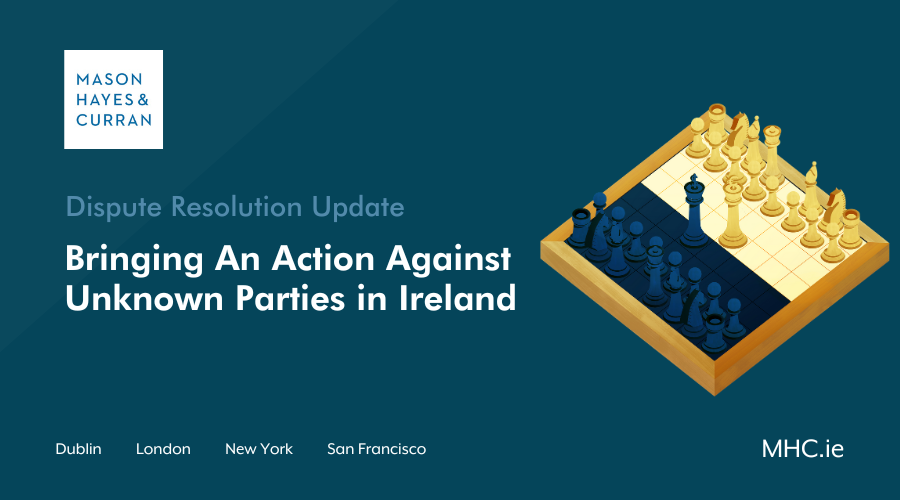Bringing An Action Against Unknown Parties in Ireland
Exceptional Cases Only?

A recent Supreme Court decision has confirmed that commencing and continuing proceedings against defendants referenced as ‘persons unknown’ is exceptional and that once the relevant individuals become known the proceedings should be amended to identify them by name. Gearoid Carey and Gerard Kelly, Partners, review the implications of this decision.
The Supreme Court has recently addressed the propriety of proceedings commenced and continued against ‘persons unknown’ often referred to as cases against John Doe or Jane Doe.[1] The case dealt with an appeal seeking to set aside contempt orders made in favour of the plaintiff against unnamed individuals occupying two properties. Although the appeal addressed a number of issues regarding the contempt findings, the first issue considered by the Supreme Court and the specific focus of this analysis was the jurisdiction to bring proceedings against ‘persons unknown’. Although the case was moot insofar as the plaintiff no longer owned the properties, the Supreme Court was satisfied that it should give guidance because the prior decisions of the lower courts otherwise had precedential effect. Ultimately, the portion of the Supreme Court decision relating to ‘persons unknown’ being stated defendants highlights the exceptional nature of the entitlement to issue such proceedings. Further, whilst it may be necessary in appropriate cases to proceed in that way when commencing an action, once the persons involved become known the proceedings should be amended to identify them.
Of course, the Irish courts have also long recognised Norwich Pharmacal[2] relief where an innocent intermediary can be ordered to disclose the identity of a wrongdoer when the plaintiff has no other way of identifying the wrongdoer. This often arises where a plaintiff wants to take an action against a social media account user for instance. However, there are times when such relief is not available and the action must be taken against persons unknown.
Background
This case involved two properties where a secured lender obtained orders for possession in 2008, which was upheld on appeal in 2014. Ownership of the properties then passed between various banks and finance houses. In 2020, the then owner of the loans and mortgages relating to the properties, the plaintiff, issued proceedings against the occupants as ‘persons unknown’. Two of the occupants entered appearances before a High Court injunction application hearing in November 2020. The identity of all occupants was ascertained following the filing of an affidavit on their behalf for contempt proceedings in February 2021. Thereafter, the High Court ruled on the contempt proceedings in June 2021, the Court of Appeal decision was delivered in July 2022, Supreme Court leave was granted on 17 February 2023 and the Supreme Court decision issued at the end of July 2023. At all times during the progression of the contempt proceedings to the end of July 2023, the defendants remained described as ‘persons unknown’.
The ‘unknown persons’ jurisdiction
The Supreme Court acknowledged that the jurisdiction to issue proceedings against ‘persons unknown’ was not provided for in the Rules of the Superior Courts (RSC) which are in fact premised upon litigation involving named persons. However, it recognised that the entitlement to bring proceedings against ‘persons unknown’ derived from the inherent jurisdiction of the court. Mr Justice Hogan on the Supreme Court bench observed that if there were no jurisdiction to do so, “it would place a premium on anonymity and deliberate evasion and place an effective remedy in respect of matters such as illegal strikes, copyright piracy, internet defamation, internet hackers, and blackmailers (and these examples could be much extended) beyond the capacity of many litigants…. Cases would fail not because of their intrinsic merits, but for want of an identified or identifiable defendant.”
However, he went on to note that there were several reasons why that jurisdiction is, and should remain, an exceptional one. He elaborated on two, as follows:
- The fact that “publicity is an inherent feature of the open administration of justice” provided for under the Constitution and he quoted former Chief Justice Ó Dálaigh to the effect that “…publicity, deserved or otherwise, is inseparable from the administration of justice in public.”[3] Mr Justice Hogan further explained this reason by commenting that “the administration of justice should not be placed at the mercy of those who would resort to anonymity and evasion as a ploy to hand trip the efforts of plaintiffs”. However, he conceded that although “resorting to the expedient of suing persons unknown should very much remain the exception, it may sometimes be necessary to do so.”
- Litigation involving ‘persons unknown’ can cause confusion and uncertainty. In particular, from the plaintiff’s perspective, issues may arise on enforcement if the relevant party is not actually identified. The Supreme Court stated that a plaintiff should only sue persons unknown “in exceptional cases where this step was truly warranted.”
Application to facts
Mr Justice Hogan expressed a reservation as to whether this case was one where proceeding with ‘unnamed persons’ as defendants was truly warranted. He noted that this was not like a crowd trespass case with participants changing over time, since the occupancy of the property here was stable. Instead, he felt that it ought to have been possible for the plaintiff to have done more to identify most, if not all, of the occupants. However, he accepted that it seemed that many of them did not wish to be identified. Overall, he did not fault the plaintiff for resorting to the expedient of ‘persons unknown’ when commencing the action. However, despite that finding, he warned that:
“… this must be regarded as best a marginal case for the use of this mechanism and unlike the more obvious examples – such as threats of internet blackmail or copyright theft – it should not necessarily be regarded as benchmark. Apart from anything else, a plaintiff who resorts to suing persons unknown risks the complications of enforcement at a later stage in the proceedings, so that it is in the interests of litigants themselves that defendants are named. I repeat that any departure from this rule should be exceptional.”
Consequently, he stated that the title of the proceedings should have been amended once the identities of the occupants became known. He observed that such amendments to the existing proceedings could have been accommodated under RSC Order 15, rules 13 and 14, without the need to re-commence the proceedings. The courts, he said, should be prepared to amend the title of proceedings under those rules once the identity of a previously unknown party became known.
In concluding, the Supreme Court reiterated the two reasons why proceeding against ‘persons unknown’ was exceptional, repeating that this was a marginal case for the use of the mechanism and noted that there was no reason why the title of the proceedings could not have been amended as the identities of the individuals became known. However, in the course of his judgment, Mr Justice Hogan acknowledged that the case here concerned identifiable persons whose names appeared to have been unknown at the time of commencement of proceedings, and that this was not a case involving entirely anonymous and unidentifiable defendants to which different considerations arose which he said were not necessary to examine for the purpose of this appeal.
Conclusion
The decision clarifies that proceeding against ‘persons unknown’ is an exception to the general requirement in Irish procedure that defendants should be identified by name. In appropriate cases it may be permissible to sue ‘persons unknown’, especially if their identity cannot be confirmed prior to issue. However, the decision makes clear that as ‘persons unknown’ are identified, assuming that is possible, the title of the proceedings should be amended to record the appropriate name(s). Apart from the statements of principle set out in the judgment as to why this should occur, there is a practical benefit to doing so by having a named party against which enforcement may be pursued.
For more information and expert advice on bringing such claims, contact a member of our Commercial Disputes team.
The content of this article is provided for information purposes only and does not constitute legal or other advice.
[1] Pepper Finance Corporation (Ireland) DAC v Persons Unknown in Occupation of the Property known as 21 Little Mary Street, Dublin 7 and Pepper Finance Corporation (Ireland) DAC v Persons Unknown in Occupation of the Property known as 31 Richmond Avenue, Dublin 3 [2023] IESC 21.
[2] Norwich Pharmacal Co v Customs and Excise Commissioners [1974] AC 133
[3] Beamish & Crawford Ltd. v. Crowley [1969] IR 142, p. 146.
Share this:




